In celebration of the status of E.B. White 1921 as a Big Red literary icon, here’s a wide-ranging sampling of notable books—bestsellers, winners of prestigious awards, the basis for major films, and more—by fellow Cornellians. There’s something for everyone, with dozens of titles in a variety of genres: literature, mystery, horror, comedy, nonfiction, memoir, young adult, short stories, and poetry.
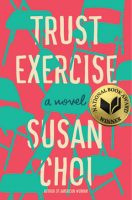 Trust Exercise
Trust Exercise
Susan Choi, MFA ’95
Choi was a Pulitzer Prize finalist for American Woman, a fictional take on the Patty Hearst tale. Trust Exercise, her fifth novel, won the 2019 National Book Award. It follows students at a suburban performing arts high school in the early 1980s, eventually jumping ahead fifteen years. As the New York Times observed, the book is “packed with wild moments of grace and fear and abandon,” as what begins as a well-observed story of love and heartbreak between two teenagers “becomes a metafictional commentary on all that has gone before.”
 The Fighters
The Fighters
C.J. Chivers ’87, BA ’88
Chivers, a former Marine, is a Pulitzer-winning war reporter for the New York Times. In this 2018 bestseller, he brings to life the ongoing conflicts in Afghanistan and Iraq through the experiences of six military members including a helicopter pilot, a corpsman (medical staffer), and an infantry officer. As the Times observed in a review: “This is a book about the lower ranks who experience the thing itself, the gut-wrenching violence and confusion of war—history from the ground up, not from the top down, precisely what Washington elites miss.”
 Lovecraft Country
Lovecraft Country
Matt Ruff ’87
Ruff’s 2016 fantasy/horror novel is the basis for the current HBO series, nominated for a Golden Globe for best TV drama. The protagonist is an African American veteran of the Korean War who encounters both fantastical monsters and the real-world horrors of Jim Crow-era racism as he and his relatives travel in search of his missing father. “If nothing else,” observed Kirkus, “you have to giggle over how this novel’s namesake [horror legend H.P. Lovecraft], who held vicious white supremacist opinions, must be doing triple axels in his grave at the way his imagination has been so impudently shaken and stirred.”
 The Tiger’s Wife
The Tiger’s Wife
Téa Obreht, MFA ’08
Obreht’s debut novel, a New York Times bestseller and a finalist for the National Book Award, landed on a slew of 2011 top ten lists. As an NPR headline put it, “magical realism meets big cats” in this tale of a young medical student who wrestles with the ghosts of war in an unnamed Balkan country—resembling Obreht’s native Yugoslavia—as she copes with her grief over the recent death of her grandfather. Former President Barack Obama put her second novel—Inland, another Times bestseller—on his 2019 summer reading list.
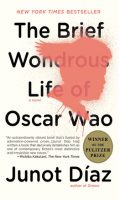 The Brief Wondrous Life of Oscar Wao
The Brief Wondrous Life of Oscar Wao
Junot Díaz, MFA ’95
Widely hailed as one of the best books of 2007, Oscar Wao garnered Díaz a Pulitzer and a National Book Critics Circle Award, among other honors. Its hero, a first-generation Dominican American, is a nerdy, overweight boy growing up in New Jersey who devours sci-fi and fantasy novels and fears he’ll never find love. As Publishers Weekly observed: “By the prologue’s end, it’s clear that this story of one poor guy’s cursed life will also be the story of how 500 years of historical and familial bad luck shape the destiny of its fat, sad, smart, lovable, and short-lived protagonist.”
 Snow Angels
Snow Angels
Stewart O’Nan, MFA ’92
The prolific O’Nan has penned more than a dozen novels, plus short stories and works of nonfiction—including a wrenching study of the 1944 Hartford Circus Fire and a book on the Red Sox co-authored with Stephen King. His first novel, Snow Angels, became a 2007 film starring Sam Rockwell and Kate Beckinsale. Set outside Pittsburgh in the winter of 1974, it centers on a fourteen-year-old boy coping with both his parents’ divorce and a violent tragedy involving his former babysitter.
 Too Big to Fail
Too Big to Fail
Andrew Ross Sorkin ’99
On the New York Times bestseller list for six months, Sorkin’s 2009 nonfiction work chronicles the financial crisis that befell the nation the previous year, based on numerous interviews with leading corporate executives and federal officials. Said a Times review: “Sorkin’s prodigious reporting and lively writing put the reader in the room for some of the biggest-dollar conference calls in history.” It was adapted into a 2011 HBO drama.
 The Expats
The Expats
Chris Pavone ’89
Pavone’s 2012 New York Times bestselling spy thriller won both the Edgar and the Anthony, mystery fiction’s top awards. His heroine is a former CIA assassin trying to adjust to the comparatively humdrum life of a wife and mother living in Luxembourg. But given her many secrets and the potential for current peril, her past threatens to catch up with her. Pavone followed The Expats—which Publishers Weekly praised as “meticulously plotted” and “psychologically complex”—with a sequel, The Paris Diversion.
 The Girls’ Guide to Hunting and Fishing
The Girls’ Guide to Hunting and Fishing
Melissa Bank, MFA ’88
Entertainment Weekly called this New York Times bestselling collection of seven interlinked short stories from 1999 a “swinging, funny, and tender study of contemporary relationships.” The title tale—inspired by now-infamous dating advice books of the era like The Rules—follows a woman who hits it off with a fellow guest at a wedding. But their relationship goes off the rails when she tries to stick to the “play hard to get” formula laid out in How to Meet and Marry Mr. Right.
 Unstoppable
Unstoppable
Bill Nye ’77
The New York Times bestseller by TV’s beloved “Science Guy” is a call to arms for (to quote the subtitle) “harnessing science to change the world”—specifically, combatting climate change and shifting to renewable energy. As Neil deGrasse Tyson said in a blurb: “Unstoppable is what you get when you melt down Bill Nye the Science Guy and turn him into a book,” going on to call it “a must-read for anybody who needs to be scientifically literate in the twenty-first century.” Unstoppable was a follow-up to Nye’s previous bestseller, Undeniable: Evolution and the Science of Creation.
 The Devil Wears Prada
The Devil Wears Prada
Lauren Weisberger ’99
Meryl Streep was nominated for an Oscar and won a Golden Globe for her barbed turn as the title’s fashionably shod villainess in the 2006 hit film of Weisberger’s 2003 New York Times bestseller. (Aptly, the costumes also won numerous awards.) Streep played Miranda Priestly, the grande dame of an iconic fashion magazine—believed to be modeled on Anna Wintour and Vogue, where the author worked after Cornell—who eats up young assistants and spits them out. Anne Hathaway portrayed the protagonist, a new college grad who lands a highly coveted job under Priestly and lives to regret it.
 Dear Committee Members
Dear Committee Members
Julie Schumacher, MFA ’86
This 2015 epistolary novel—in the form of increasingly strident communications between academics, on matters both professorial and personal—was named one of the year’s best books by NPR and the Boston Globe and won Schumacher the Thurber Prize for American Humor, making her the first woman to receive it. (Previous winners include David Sedaris, Jon Stewart, and Calvin Trillin.) The protagonist is a hapless, recently divorced professor at an undistinguished university; Schumacher continued his comic adventures in a 2018 sequel, The Shakespeare Requirement.
 The Nazis Next Door
The Nazis Next Door
Eric Lichtblau ’87
Lichtblau, a Pulitzer-winning journalist for the New York Times, turns his reportorial eye on a little-known fact of post-World War II history: some 10,000 former Nazis—including high-level officers—were quietly resettled in the U.S. Their emigration sometimes came with the help of the American government, which aimed to use them as scientific or intelligence assets. “Lichtblau brings ample investigative skills and an elegant writing style to this unsavory but important story,” the Times said of the 2014 bestseller, calling it “a captivating book rooted in first-rate research.”
 Vinegar Hill
Vinegar Hill
A. Manette Ansay, MFA ’91
Ansay took the title of her wrenching debut novel from the name of a steep street on the west side of Ithaca, near Cayuga Lake. The plot, set in 1972, involves a schoolteacher who, along with her unemployed husband and two children, is forced by financial circumstances to move back to her rural Wisconsin hometown—and into the unhappy home of her demanding, eccentric, and devoutly Catholic in-laws. An Oprah’s Book Club selection five years after its publication in 1994, Vinegar Hill went on to become a 2005 TV movie starring Mary-Louise Parker and Tom Skerritt.
 The Sun Is Also a Star
The Sun Is Also a Star
Nicola Yoon ’94
Both this and Yoon’s previous young-adult novel—Everything, Everything, about a teen confined to her home due to an immune condition—were New York Times bestsellers and had film adaptations. The Sun Is Also a Star, a finalist for the National Book Award, has dual high school-age narrators—one a Jamaican-born girl about to be deported, the other a Korean American boy on his way to a college admissions interview—who meet and fall in love on the streets of New York in a single day. School Library Journal called it “part coming-of-age, part romance, and all extraordinary.”
 We Wish to Inform You That Tomorrow We Will Be Killed With Our Families
We Wish to Inform You That Tomorrow We Will Be Killed With Our Families
Philip Gourevitch ’86
Kirkus called Gourevitch’s 1998 nonfiction work—which garnered numerous honors including the National Book Critics Circle Award and the Polk Award for Foreign Reporting—“a probing chronicle of the mass ethnic slaughter in Rwanda that raises questions about human survival and coexistence in that country and everywhere.” Gourevitch, a New Yorker writer and the child of Holocaust survivors, delves into the roots of the 1994 genocide that took a million lives, sharing tales of loss and survival garnered through multiple reporting trips.
 Pitch Perfect
Pitch Perfect
Mickey Rapkin ’00
Rapkin’s 2008 work of nonfiction, subtitled The Quest for Collegiate A Cappella Glory, followed a season’s worth of onstage and backstage drama in the quirky subculture of competitive university singing groups. (Rapkin had experience with the art form, having sung on the Hill with Cayuga’s Waiters.) A fictionalized take on Rapkin’s book formed the basis for the blockbuster 2012 film starring Anna Kendrick and Rebel Wilson—plus two sequels. Rapkin’s other books include Theater Geek, about Stagedoor Manor, the legendary performing arts camp in Downstate New York’s Sullivan County.
 A Clean Kill in Tokyo
A Clean Kill in Tokyo
Barry Eisler ’86, JD ’89
Originally published under the title Rain Fall, the 2002 thriller is the first in Eisler’s bestselling series about antihero John Rain, a Vietnam veteran and Tokyo-based assassin who specializes in making deaths look like natural causes. The son of an American mother and a Japanese father, Rain finds his personal and professional lives complicated—and his life in danger—when he falls for the daughter of his latest victim. The book was made into a 2009 film featuring Gary Oldman as one of Rain’s adversaries, a master spy. The most recent entry in the series, The Killer Collective, was published in 2019.
 The Game
The Game
Ken Dryden ’69
Considered by many to be the best book ever written about hockey, Dryden’s 1983 memoir—which Sports Illustrated called one of the top ten sports books of all time—was re-released in a thirtieth anniversary edition featuring new photos and an additional chapter. In the book, which Dryden wrote during his last season as a player, the Big Red superstar and legendary NHL goalie offers vividly detailed recollections of life on and off the ice. A former member of Canada’s parliament, Dryden has penned several other books including Game Change (2017), which explores the epidemic of traumatic brain injury among former players.
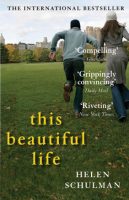 This Beautiful Life
This Beautiful Life
Helen Schulman ’83
Publishers Weekly called this New York Times bestseller—also one of the paper’s 100 Notable Books of 2011—a “sobering tale of how adolescent stupidity can have criminal and social repercussions.” Its characters confront a thorny issue of the digital age: how (and whether) to punish teens who share sexually explicit images of themselves and others. Here, a fifteen-year-old boy attending a posh NYC prep school (having just moved to the city from Ithaca) faces potentially life-altering consequences after he forwards an unsolicited video he received from a younger girl.
 The Zookeeper’s Wife
The Zookeeper’s Wife
Diane Ackerman, MFA ’73, PhD ’79
Publishers Weekly called Ackerman’s 2007 nonfiction book—a New York Times bestseller chronicling how staff at the zoo in Warsaw, Poland, saved several hundred people from the Nazis during World War II by hiding them in their bombed-out facility’s empty cages—a “suspenseful, beautifully crafted story.” Jessica Chastain and Daniel Brühl starred in the 2017 film version. Ackerman’s many works include A Natural History of the Senses and One Hundred Names for Love: A Stroke, a Marriage, and the Language of Healing, a Pulitzer finalist.
 Big Machine
Big Machine
Victor Lavalle ’94, BA ’95
Lavalle’s 2009 novel won horror fiction’s coveted Shirley Jackson Award (one of multiple times he has won or been nominated) and was on numerous top-ten lists. His narrator, an African American man named Ricky, is a recovering heroin addict who travels to northern Vermont to join a secret society of scholars—originally founded by a runaway slave and made up of Black people with backgrounds similar to Ricky’s—who investigate the supernatural and combat evil forces. Lavalle’s other critically acclaimed novels include The Ecstatic, The Devil in Silver, and The Changeling.
 Half the Sky
Half the Sky
Sheryl WuDunn ’81
WuDunn and her husband, Nicholas Kristof, won a Pulitzer for their New York Times coverage of China’s democracy movement, including the 1989 Tiananmen Square protests. They’ve also co-authored four bestsellers, including this one from 2009—which chronicles challenges facing women and girls in the developing world and ways to overcome them—that was made into a PBS documentary. Their subjects include a Cambodian teen who was trafficked into sex work but escaped and became a successful merchant, and an Ethiopian woman who overcame debilitating injuries she suffered while giving birth and went on to train as a surgeon.
 Birds of America
Birds of America
Lorrie Moore, MFA ’82
As the New York Times observed, “many of the characters in this volume are women trapped in—or abruptly ejected from—shopworn relationships.” The twelve stories in this highly praised collection concern such events as a visit to Ireland’s Blarney Stone and a yuppie-filled New Year’s Eve party—scenarios through which inner lives are revealed. “Acutely aware of her characters’ obsession with their own emotional temperatures,” said the Times, which called it one of the best books of 1998, “Ms. Moore can be devastatingly funny about their self-absorption and their awareness of their self-absorption.”
 The End of History and the Last Man
The End of History and the Last Man
Francis Fukuyama ’74
This 1992 New York Times bestselling work of political philosophy—an expansion of a widely read essay published several years earlier—helped put Fukuyama on the map. In it, he argues that the post-Cold War era heralded “the end point of mankind’s ideological evolution and the universalization of Western liberal democracy as the final form of human government.” Kirkus called the book, which has sparked debate since its publication, “an important work that affords significant returns on the investments of time and attention required to get the most from its elegantly structured theme.”
 Felt
Felt
Alice Fulton, MFA ’82
Fulton is a professor emerita of English at Cornell. Her 2001 collection, Felt, won the Bobbitt National Prize for Poetry, given by the Library of of Congress to the finest work by an American published in the preceding two years. The volume, said the award committee, “sizzles with logophilia and tropes, is blessed with the kind of direct wiring between sensation and language, feeling and form, that strikes first with physical and then with intellectual and emotional wallop.”
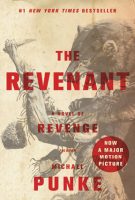 The Revenant
The Revenant
Michael Punke, JD ’89
The 2015 film adaptation of Punke’s book won three Oscars—including Best Actor (Leonardo DiCaprio) and Best Director (Alejandro Iñárritu)—and was nominated for nine more. Kirkus called this 2002 New York Times bestseller “a good adventure yarn, with plenty of historical atmosphere and local color.” The plot—set in 1823 and based on a true story—concerns a fur trapper who is near-fatally mauled by a grizzly bear. After the two colleagues tasked with caring for him instead leave him to die, he traverses the frontier on a quest to exact revenge.
 Europe Central
Europe Central
William Vollmann ’81
The New York Times described Vollmann’s work, which won a 2005 National Book Award, as “part novel and part stories, virtuoso historical remembrance and focused study of violence.” In thirty-seven chronologically arranged tales, Vollmann taps real-life characters to highlight the brutality of the World War II-era conflict between Russia and Germany. “In the small set of America’s best contemporary novelists,” said Publishers Weekly, “Vollmann is the perpetual comet.”
 Last Flag Flying
Last Flag Flying
Darryl Ponicsán, MA ’65
A sequel to his acclaimed 1970 novel, The Last Detail—which was adapted into a now-classic film starring Jack Nicholson—Ponicsán’s 2005 tale reunites three Vietnam veterans as one is about to bury his son, a Marine killed in Iraq. It was made into a 2017 film directed by Richard Linklater and starring Steve Carell, Bryan Cranston, and Laurence Fishburne.
 The Butcher’s Boy
The Butcher’s Boy
Thomas Perry ’69
Perry is the prolific author of several mystery series; his 1982 debut won the Edgar Award for best first novel. It features two protagonists: a professional hitman—known only by the code name of the title—who himself becomes the target of a murder-for-hire contract, and the female Justice Department analyst who is on his trail.
 Inherent Vice
Inherent Vice
Thomas Pynchon ’59
“For better and worse,” wrote Kirkus, “this is the closest Pynchon is likely to come to a beach book. A psychedelic beach book, of course: it’s hippie-era Los Angeles, and our hero smokes marijuana the way others smoke cigarettes, which is something of an occupational hazard in a profession that requires deductive abilities.” Set in the 1970s, Pynchon’s 2009 bestseller follows the adventures of private eye Larry “Doc” Sportello. Joaquin Phoenix played him in the 2014 film version, also starring Josh Brolin and Owen Wilson.

Big Red Backdrop
A roundup of novels set on the Hill
Come back to campus with these books that take place at Cornell—the real one or a fictionalized version—listed in rough chronological order by the era in which they unfold. While some are out of print and may be harder to find, copies can generally be located online.
 The Widening Stain
The Widening Stain
Morris Bishop 1913, PhD 1926
Writing under the pen name W. Bolingbroke Johnson, Bishop produced what Publishers Weekly called a “sparkling academic mystery.” The heroine is a librarian at an unnamed university (clearly Cornell) who finds the body of a popular female French instructor who was last seen at a party at the president’s house—a seemingly accidental death that’s followed by the discovery of a strangled man inside a locked room. First published in 1941, it has enjoyed several reprints.
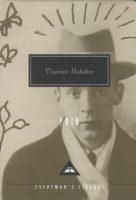 Pnin
Pnin
Vladimir Nabokov
The author taught on the Hill from 1948 to 1959—and this 1957 novel has as its title character a struggling Russian émigré on the faculty of “Waindell College.” “Pnin is Nabokov as he might have been in American exile,” observed the Guardian, “if he had not possessed a mastery of the English language, a supportive and cherished wife, and the resource of literary creativity—a quaint, eccentric, rather sad figure, doomed never to understand fully the society in which he finds himself.”
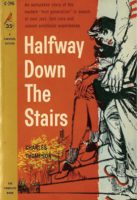 Halfway Down the Stairs
Halfway Down the Stairs
Charles Thompson ’51, MA ’52
Thompson’s debut novel, published in 1957, follows a young couple—from their meeting in a New England resort town to their time on the Hill to post-grad life in NYC—who are part of a bohemian crowd during a post-Korean War era of shifting values. “Mr. Thompson has striven valiantly,” observed a New York Times review, “to be completely honest in his picture of a generation without conventional morals or visible purpose.”
 Been Down So Long It Looks Like Up to Me
Been Down So Long It Looks Like Up to Me
Richard Fariña ’59
Cornell is named Mentor University in this 1966 novel, which was published just two days before Fariña’s death in a motorcycle accident. Now a counterculture classic, the book—in the words of his friend Thomas Pynchon ’59—“comes on like the Hallelujah Chorus done by 200 kazoo players with perfect pitch.” Its protagonist, a recent grad named Gnossos Pappadopoulis, explores the psychedelic offerings on and off campus in a certain Upstate college town.
 And the Sparrow Fell
And the Sparrow Fell
Robert Mrazek ’67
Published by Cornell University Press, this 2017 novel by the former U.S. Congressman and prolific author tells the coming-of-age tale of two brothers from a wealthy Long Island family who are both undergrads on the Hill during the Vietnam era. One is passionately opposed to the war, while the other is eager to prove himself in battle in the mold of their father, who won the Medal of Honor for service in World War II.
 A Journey to Sahalin
A Journey to Sahalin
James McConkey
“Mr. McConkey is a professor of English at Cornell and observed firsthand the troubles there,” the New York Times wrote in its review of this 1971 novel about a university in the aftermath of a polarizing protest for Black student rights. “He is completely convincing. Of the book’s many qualities, the one that most impressed me was the unforced tenderness that suffuses it.” The protagonist is the dean of students—the man at the center of the fraught debate over whether to punish the protesters—at the school, dubbed Brangwen.
 Crossover
Crossover
Dennis Williams ’73
Another novel to take inspiration from the historic racial turmoil on the Hill a half-century ago, Crossover follows an African American student who matriculates at Cornell in 1969 and undergoes a political awakening. Kirkus called the 1994 book by Williams, a former Cornell faculty member who has also served as an editor at Newsweek, a “solid, insightful debut.”
 Audition for Murder
Audition for Murder
P.M. Carlson ’61, PhD ’74
This 1985 mystery with a theatrical backdrop is the first in Carlson’s Maggie Ryan series, which stars an amateur sleuth who’s a grad student at a university resembling Cornell (and in an Ithaca-like town) beginning in the late Sixties. Carlson followed up with Murder Is Academic, set amid antiwar protests and violent threats facing women on campus, and then six more, including Murder Is Pathological and Murder in the Dog Days.
 The War Between the Tates
The War Between the Tates
Alison Lurie
Lurie, a professor emerita of English who passed away in December, named her thinly disguised Cornell “Corinth University.” In this 1974 novel—made into a 1977 TV movie starring Elizabeth Ashley and Richard Crenna—it’s the backdrop for upheaval in a faculty marriage, after the wife learns that her professor husband has been having an illicit affair with a grad student, who’s now pregnant. Lurie’s 1984 Pulitzer winner, Foreign Affairs, followed two Corinth profs on sabbatical in London.
 Fool on the Hill
Fool on the Hill
Matt Ruff ’87
“This exuberant first novel unfolds at Cornell University, the alma mater of its twenty-two-year-old author,” noted Publishers Weekly, “who has re-imagined his school as the center of a violent and funny modern-day fairy tale.” Ruff’s 1988 work, now a cult classic, chronicles the adventures of a young writer-in-residence at a fantastical version of the Hill—complete with a sorceress, talking animals, and a dragon.
 My Education
My Education
Susan Choi, MFA ’95
Choi’s fourth novel, published in 2013 and set at a Cornell-like institution starting in the early Nineties, is narrated by a grad student who’s attracted both to one of her professors and to his wife. But, wrote the L.A. Times, “this is just the background against which the larger story unfolds. What Choi . . . is after is the elusive territory of experience, the way people and events imprint us when we’re young and then linger, exerting a subtle pressure over how we live our lives.”



And don’t forget HUNTING TEDDY ROOSEVELT and COLDWATER REVENGE by James A Ross, Arts ‘75, Law ‘82
In an act of shameless self promotion, I’ll add to the list of Cornell authors my book, The Wall Street Professional’s Survival Guide, a best-selling and the only career guide for people who work, or want to work, on Wall Street. I’ll also be featured this June in Crain’s 2021 Notable LGBTQ Leaders and Executives. Roy Cohen ‘77
Another great book by an alumna is Angel on the Ropes, by Jill Shultz (’85). It’s an excellent science fiction story with a social justice theme, involving persecution, a sanctuary movement, and an amazingly well-rendered circus on an off-world colony. More information is available at https://jillshultz.com/Angel-on-the-Ropes.html, at which you can also read chapter one for free.
Take a peek at “Village at War: An Account of Conflict in Vietnam,” by Jim Trullinger, Ph.D. (Arts ’67). This work is a Cornell-inspired project from start to finish. The updated and expanded third edition was published in 2019, with a foreword by H.H. the Dalai Lama. It’s available on Amazon in paperback and as an e-book. Earlier editions featured forewords by Cornell professor George McT. Kahin and U.S. Senator Eugene McCarthy.
Great list of books and Cornell authors. Just to let you know, the last five or six years I have had a four book historical fiction/mystery series published by Random House. It’s based on a real female detective in the late nineteenth century. In order, they are Second Street Station, Brooklyn On Fire, Last Stop In Brooklyn, and Near Prospect Park. They have gotten really good reviews and are fun to read. Okay, enough self-promotion.
Lawrence H. Levy ’69
Please don’t forget last year’s wonderful novel by former Cornell Daily Sun Editor-in-Chief Howard Rodman ’71, “The Great Eastern,” which actor Keegan-Michael Key called, “My favorite read of the year.” It’s an imaginative tale about an encounter between two of fiction’s greatest seafarers, Capt. Nemo and Capt. Ahab.
As for books set on The Hill, in Kurt Vonnegut’s ’44 first novel, “Player Piano,” Cornell, without a pseudonym, makes a late appearance in chapter 28.
I’ve recently published World War II thriller, “Thieves of Paris.” In German-occupied Paris, Max St. Denis needs the help of Rose Valland, the real woman who tracked Nazi art theft, and fictional Hannah Kiesler, a Hungarian Zionist agent, to retrieve a beloved Ingres portrait snatched by the Nazis. With their help he switches a fake for the real portrait. Thieves are everywhere: among the Nazi pillagers, Vichy officials, and opportunistic French citizens, all vying to out-steal each other. As oppression of Jews grows and deportations begin, Max improvises new strategies to steal the very lives of Jews from the SS. Max embraces his role as the best thief of Paris.